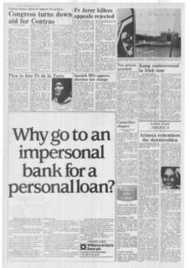Page 2, 26th April 1985
Page 2

Report an error
Noticed an error on this page?If you've noticed an error in this article please click here to report it.
Tags
Share
Related articles
Church Lobbies Against Contra Aid
Obando Plea To Reagan
Sisters Condemn Us 'contras' Aid
Nicaragua's Church Attacked From Within
`contras Cash Could Backfire On Reagan
Congress turns down aid for Contras
by Peter Stanford
PRESIDENT Reagan this week suffered a humiliating defeat when Congress turned down his plea for $14 million to aid the "contras" who are fighting to overthrow the Sandinista government in Nicaragua.
After weeks of hectic lobbying which included a claim, later denied by Vatican spokesmen, that Pope John Paul supported US policies in Nicaragua, Congress rejected the aid package, and the President is now working on a face-saving compromise with senior senators.
At a press conference days before the crucial vote, the 74-year old President told reporters that the Pope has been most supportive of all our activities in Central America". When asked if that included military aid to the "contras". the President said "I'm not going into detail, but all our activities".
Later Archbishop Pio Laghi, the papal pro-nuncio in WaShington clearly stated that the Pope does not support or endorse "any concrete plans dealing in particular with military aspects" of Reaganite policies in Central America.
Giving evidence to the congressional Foreign Affairs Committee before the aid vote, Archbishop James Hickey of Washington, on behalf of the United States Catholic Conference, condemned as "immoral" and "illegal" any military aid to either the "contras" or "any party to the fanatic! in Nicaragua",
In the days before the vote the White House, sensing a humiliating defeat, changed the terms of the aid arrangement from purely military purposes to "humanitarian aid for Nicaraguan refugees", If the Sandinistas did not give in to US demands for a restructuring of government and new elections within 60 days, the aid would then revert to military support. This compromise was also rejected by the congressional representatives.
An offer by President Daniel
Ortega of Nicaragua, made on the (eve of the congressional vote, to open discussions N.611) rebels in Nicaragua, through church-mediation, was dismissed by President Reagan's officials as "propaganda". The Sandinistas had offered a ceasefire and said that they would talk to all except those vv ho had been allies of Somoza.
After the November elections in Nicaragua, which gave the Sandirlistas a popular mandate, Laid Challis, a Elf ;fish observer at the polls, described the elections as "fair and secret", adding that "without a doubt, the Sandinistas are a democratically-elected government".
Another Catholic bishop to add his voice to the controversy over Nicaragua was Bishop Rene Gracida of Corpus Christi, who recently visited the country. In contrast to the Resorts of other bishops who were in the same party, Bishop Ciracida said that the Sandinistas "were already much worse than the brutal dictatorship of Anastasio Somoza which preceded them".
blog comments powered by Disqus











